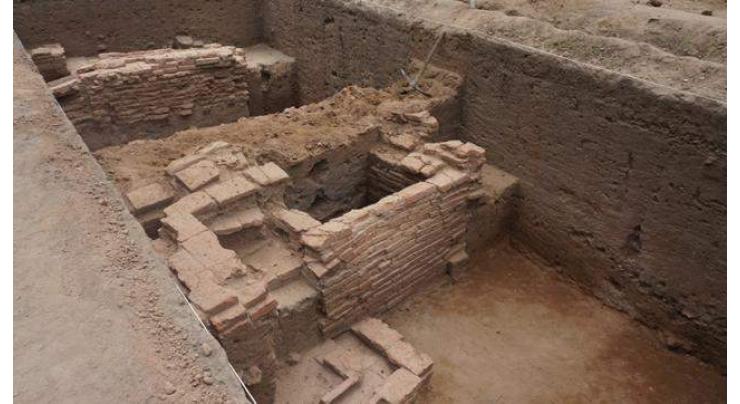
Archaeologists Rejects Indian Research Regarding Indus Valley Civilization
Rukhshan Mir (@rukhshanmir) Published August 02, 2016 | 04:52 PM

ISLAMABAD, (UrduPoint / Pakistan Point News - 2nd Augst,2016) : Archaeologists in Pakistan have rejected Indian archaeologists' research stating that Indus Valley Civilization was 8,000 years old instead of 5,500 and originated from inland proper India proliferated and spread westward from India to the eastern border of Pakistan. The research was conducted by the researchers of Archeological Survey of India and Indian Institute of Technology and presented through one of prestigious journal `Nature' with title "Indus valley civilization much older than thought". Talking to APP, Archeology expert and former Director General of Archeology and Museums, Dr.Fazal Dad Kakar termed this research was based on false facts and was an intellectual aggression on the front of Indus valley civilization. Dr.Kakar, candidly refused to accept the age of Indus valley civilization as 8,000 year old and said that somebody surely twisted the reports of the scientists intentionally to create furor academicus, provoking excessive excitement over an intellectual issues.
Researchers most probably were referring to the dates of antecedents and formative stages of cultures from Mesolithic period through Neolithic (9,000-6,000)in this part of the world which culminated into mature bronze age (300 BC) Indus valley civilization at a date which might be estimated about (2,500-2,400 BC)termed at the sites of Harappa and Moenjodaro as the "Indus valley civilization", said Dr.kakar. He said a method of thermoluminescence was used as a means of dating ancient artifacts, particularly the property of some ceramics and other materials of becoming luminescent when pretreated and heated.
This technique was used to date prothery shards of early Harappan time to 6,000 years and early Harappan and Hakra phase as far back as 8,000 years, quoted by Anindya Sarkar of deptt of Geology and Geophysics at IIT-Kharagpur. He said the statement of the researchers that they have recovered perhaps the oldest pottery from the civilization is misleading.
"They actually recovered pottery from a site but not civilization as single site which is even not named, do not constitute neither a culture nor civilization," he said. Indian scientist trying to make believe the world that Indus valley civilization is originated from inland proper India proliferated and spread westward from India to the eastern border of Pakistan, comprising of Cholistan and Thar Desert which is wrong. Dr.Kakar, emphasized that "the basic aim of the Indian team of the scientists had actually set out to prove that the civilization proliferated to other Indian sites like Bhirrana and Rakhigarrhi in Haryana, apart from the known location of Harappa and Moenjodaro in Pakistan, and Lothal, Dholavira and Kalibangan in India". He said the Archaeological milieu of the world knows very well that the sites of Balouchistan Plataeu and high land of Khyber Pakhtunkhwa, represents all cultural levels such as pastoral, early farming village communities and sedentary urbanized village life. He added these were the result of process of evolution from the Mesolithic period or stage lasting in this region from about at least 18,000 BC, known from Magdalenian painting and engraving and from some flint tools sites in region, transformed into Neolithic stage (Mehrgarh 9,000-6,000) than Chalecothic and finally to the Mature Bronze Age (3000 BC) stage. Therefore the Balouchistan Plataeu and high land of Khyber Pakhtunkhwa is considered as the homeland for the development of various cultural, social and economic experiment that provided the necessary antecedents and formative stages for the rise of civilization in the Indus valley proper in Pakistan at Harappa and Moenjodro. While at the later stage of Mature Bronze Age, Indus Civilization expended eastward beyond Saraswati or Gahkkar-Hakra river as attested at the sites of Lothal, Kalibangan and Dholavira etc, in India, he said.
Related Topics
Recent Stories

Currency Rate In Pakistan - Dollar, Euro, Pound, Riyal Rates On 20 April 2024

Today Gold Rate in Pakistan 20 April 2024

Tennis: ATP Barcelona Open results - 1st update

Swiatek's perfect 10 in Stuttgart as Vondrousova stuns Sabalenka

Arandu's roads closed due to flooding

Oil tanker catches fire in Islamabad’s Blue Area

Pakistan committed to ensure safety of foreign nationals: FO

Tennis: WTA Stuttgart results - 1st update

Four passengers injured as train hit an empty vehicle

Over- speeding bus crushed to death two bike riders

Turkey's Freedom Flotilla ready to set sail for Gaza

French teen dies from heart failure after knife attack near school
More Stories From Pakistan
-
Alleged outlaw sustains bullet injuries by firing of accomplices
52 minutes ago -
Rain spell: Wheat crop flooded in some areas of Kot Addu
1 hour ago -
Torrential rain paralyzes life in upper Swat, Shangla
2 hours ago -
NHA restores most roads across the country after heavy rains
9 hours ago -
Three bike lifter gang held, five stolen motorbikes recovered
9 hours ago -

Arandu's roads closed due to flooding
11 hours ago
-

Oil tanker catches fire in Islamabad’s Blue Area
11 hours ago -

Pakistan committed to ensure safety of foreign nationals: FO
11 hours ago -

Four passengers injured as train hit an empty vehicle
11 hours ago -

Over- speeding bus crushed to death two bike riders
11 hours ago -

UAF celebrates Int'l Chinese Language Day
12 hours ago -

Flooding on Chitral-Peshawar Highway strands travelers
12 hours ago






